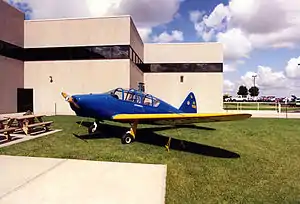Piper PT-1
The Piper PT-1 was a 1940s American two-seat primary training monoplane designed and built by Piper Aircraft at Lock Haven. A low-wing tandem two-seat monoplane, the PT-1 was the first Piper aircraft to have a low-wing. It had a fabric covering over an all-metal fuselage frame and wooden spar wings and tail unit. The PT-1 had a retractable tailwheel landing gear and was powered by a 130 hp (97 kW) Franklin 6AC-2980D engine. No further aircraft were built. A four-seat development was designed as the Piper PWA-6 which did not go into production either.
| PT-1 Trainer | |
|---|---|
 | |
| Role | Monoplane trainer |
| Manufacturer | Piper Aircraft |
| First flight | 1942 |
| Number built | 1 |
Specifications (PT-1)
Data from Jane's all the World's Aircraft 1947[1]
General characteristics
- Crew: 2
- Length: 22 ft 8 in (6.9 m)
- Wingspan: 35 ft 2 in (10.72 m)
- Height: 6 ft 6 in (1.98 m)
- Empty weight: 1,325 lb (601 kg)
- Gross weight: 2,000 lb (907 kg)
- Powerplant: 1 × Franklin 6AC-298 6-cyl. air-cooled horizontally-opposed piston engine, 130 hp (97 kW)
- Propellers: 2-bladed fixed pitch wooden airscrew
Performance
- Maximum speed: 150 mph (240 km/h, 130 kn) plus
- Cruise speed: 135 mph (217 km/h, 117 kn) plus
- Landing speed: less than 50 mph (43 kn; 80 km/h)
- Range: 700 mi (1,100 km, 610 nmi)
- Service ceiling: 12,400 ft (3,800 m)
- Rate of climb: 750 ft/min (3.8 m/s) to 1,000 ft/min (300 m/min)
See also
Aircraft of comparable role, configuration, and era
References
Wikimedia Commons has media related to Piper PT-1.
- Bridgman, Leonard, ed. (1947). Jane's all the World's Aircraft 1947. London: Sampson Low, Marston & Co. pp. 278c–279c.
Bibliography
- Auliard, Gilles (September–October 2001). ""Unknown Piper": Reviving the PT-1". Air Enthusiast. No. 95. pp. 12–13. ISSN 0143-5450.
- Peperell, Roger W.; Smith, Colin M. (1987). Piper Aircraft and their forerunners. London: Air-Britain (Historians). pp. 47–50. ISBN 0-85130-149-5.
- "Piper PT Trainer". Flying. Vol. 33, no. 1. July 1943. pp. 110, 119. Retrieved 20 August 2021.
This article is issued from Wikipedia. The text is licensed under Creative Commons - Attribution - Sharealike. Additional terms may apply for the media files.